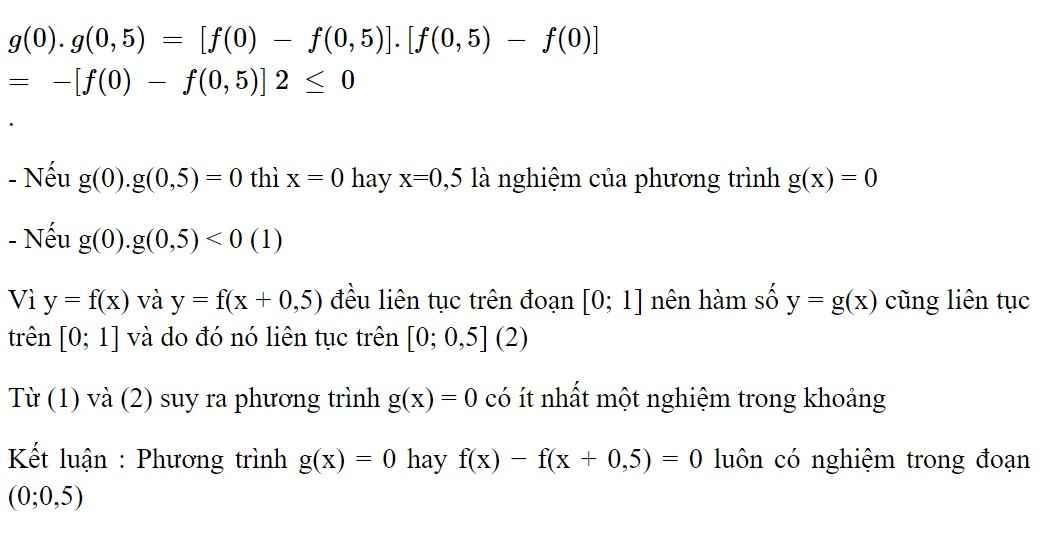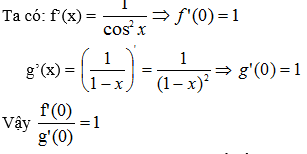Hãy nhập câu hỏi của bạn vào đây, nếu là tài khoản VIP, bạn sẽ được ưu tiên trả lời.

Tham khảo:
Xét hàm số g(x) = f(x) − f(x + 0,5)
Ta có
g(0) = f(0) − f(0 + 0,5) = f(0) − f(0,5)
g(0,5) = f(0,5) − f(0,5 + 0,5) = f(0,5) − f(1) = f(0,5) − f(0)
(vì theo giả thiết f(0) = f(1)).
Do đó,


\(\lim\limits_{x\rightarrow0}\left|f\left(x\right)\right|=\lim\limits_{x\rightarrow0}\left|x^2sin\dfrac{1}{x}\right|< \lim\limits_{x\rightarrow0}\left|x^2\right|=0\).
Vậy \(\lim\limits_{x\rightarrow0}f\left(x\right)=0\).
\(f\left(0\right)=A\).
Để hàm số liên tục tại \(x=0\) thì \(\lim\limits_{x\rightarrow0}f\left(x\right)=f\left(0\right)\Leftrightarrow A=0\).
Để xét hàm số có đạo hàm tại \(x=0\) ta xét giới hạn:
\(\lim\limits_{x\rightarrow0}\dfrac{f\left(x\right)-f\left(0\right)}{x-0}=\lim\limits_{x\rightarrow0}\dfrac{x^2sin\dfrac{1}{x}}{x}=\lim\limits_{x\rightarrow0}xsin\dfrac{1}{x}=0\).
Vậy hàm số có đạo hàm tại \(x=0\).

\(limu_n=lim\dfrac{1}{n}=0\); \(limv_n=lim\left(-\dfrac{1}{n}\right)=0\).
\(limf\left(u_n\right)=lim\left(\sqrt{\dfrac{1}{n}}+1\right)=1\).
\(limf\left(v_n\right)=lim\left(2.\dfrac{-1}{n}\right)=lim\dfrac{-2}{n}=0\).
Hai dãy số \(\left(u_n\right)\) và \(\left(v_n\right)\) đều có giới hạn 0 khi n tiến ra dương vô cùng nhưng \(limf\left(u_n\right)\ne limf\left(v_n\right)\) nên f không có giới hạn tại \(x=0\).

\(f\left(x\right)=x+\dfrac{\sqrt{x}}{x+1}\Rightarrow f'\left(x\right)=1+\dfrac{1-x}{2\sqrt{x}\left(x+1\right)^2}\)
\(f'\left(x\right)-1>0\Leftrightarrow\dfrac{1-x}{2\sqrt{x}\left(x+1\right)^2}>0\)
\(\Rightarrow0< x< 1\)